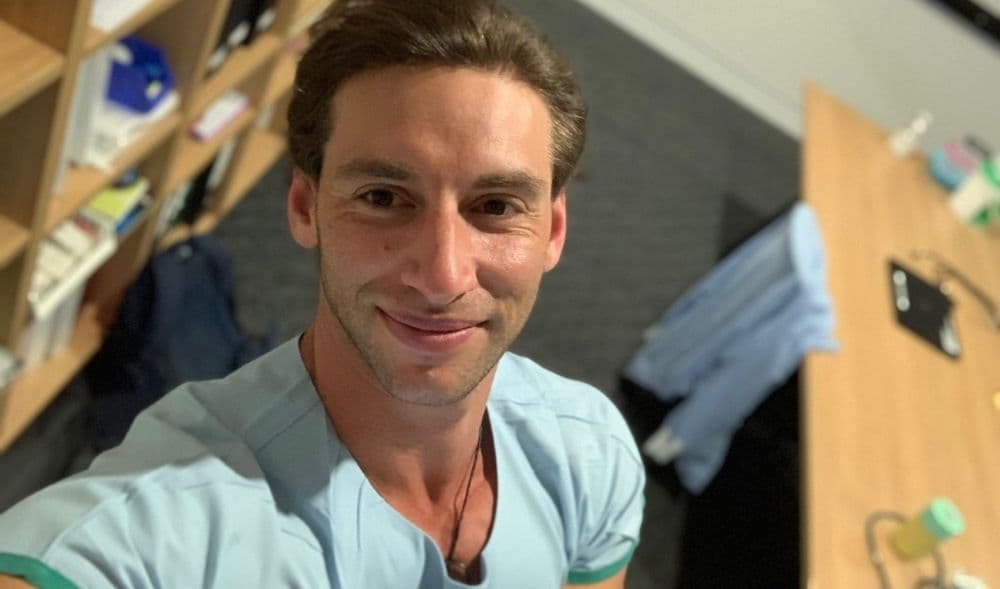How a placement saved a life

Dr Dani Bachmann is a trainee in anaesthesia. He always wanted to help people, so he became a doctor.
“I know it sounds cliché to say but my genuine dream in undertaking medicine was to make an impact in people's lives.”
His initial plan was to study business, but when he started, he realised that he lacked the “passion.” “Medicine is a vocational calling; it is a marriage of science with the art of humanity.” He took some time off after school to study personal training and volunteer at charity organisations, building schools and homes, planting vegetable gardens, and teaching AIDS.
“The ability to help the less fortunate and my fascination with anatomy and physiology started to take shape. From here, I studied exercise physiology, but in my final year, placed myself in a hospital setting doing cardiac rehab. I instantly knew this was the work environment I wanted to be in, and from that day, my entire journey took shape.”
The placement that changed it all:
Dr Bachmann emailed Jarrod, his Solution Specialist at Medrecruit, to let him know that he had a few days off, just in case any last-minute spots needed filling. A moment later, Jarrod called and said there was a hospital with no medic on site who wanted someone to head up as soon as possible. Bachmann was interested in taking on the extra work, but the role was predominantly rehab and palliative care, something he had not done in some time.
“In undertaking a job, my prime concern is always if I have the skill set to safely fill the role and ensure I am the best fit for the job.”
Jarrod got in touch with the hospital, and a moment later, they got in touch with Dr Bachmann.
After talking with the hospital, they were happy with his credentials, and Dr Bachmann was also comfortable that he had the required skills and abilities to safely and competently perform the required tasks. “I agreed to head up there immediately, offering (thankfully, as it happens) to stay for a complete 8 hr shift.”
The critical observation:
Dr Bachmann arrived at 11 am and was doing a final round when he noticed a patient who showed cause for concern.
He went into one of the rooms to check on a lovely patient he’d seen earlier in the day. When he reached the side of the bed the patient looked all but normal, but something gave Bachmann the feeling that all was not right. “Immediately entering the room, I noticed a small band of diaphoresis just above each eyebrow.”
It was a crisp winter evening, so the sweating was concerning. He asked the patient the usual questions. "Do you have a fever?" "Feel any chest pain?" "Are you experiencing shortness of breath?" "Do you have any calf pain?"
The patient answered no to each of his questions; blood sugar levels were normal, and they reported “feeling well.” “maybe just a little funny”, the patient added on an afterthought, “but not lightheaded, dizzy, or nauseous, just something...off.”
Bachmann didn’t know what to make of it; the patient had an otherwise normal examination, but the diaphoresis for him was inexplicable. Despite no cardiac symptoms or history, Dr Bachmann figured that the patient did have enough factors for him to go the extra mile, just to be sure, and to insist on an ECG.
“Given the usual patient load, ECGs are not a common investigation request, so they are offered to assist the young nurse in placing leads. The evening TL, however, volunteered to give her a hand and about 5 mins later brought me an ECG that confirmed my gut fear.”
Saving a life:
FY26 Australian Salary Guide
Download our free FY26 guide and get the inside scoop on:
Upon receiving the EGC, Dr Bachmann immediately noted subtle irregularities in the Lateral leads and instructed the nurses to call for lights and sirens transfer to be booked and for the patient to be loaded with Aspirin and Plavix.
The team administered the meds and set about packing the patients and their belongings for the transfer. Then Dr Bachmann realised he had yet to receive permission from the treating Assistant Medical Officer.
“I asked for the [Cardiology(https://medrecruit.medworld.com/doctors/cardiology-doctor-jobs-au) On Call, who agreed with my assessment after explaining the situation and ECG and asked me to contact the interventional Cardiologist. Whilst speaking, I obtained his mobile number and texted the ECGs. Explaining the lack of onsite pathology or other medics, he was happy to accept care and agreed to activate a CODE STEMI with lights and sirens directly to Cath Lab and bypassing ED.”
On arrival of the ambulance, this information was communicated, and the patient was safely transferred to a tertiary centre for care. A life was saved thanks to Dr Bachmann’s observation, the team of medical staff on-site, and the efficiency of the hospital’s systems. “It was a relief to know they were getting the optimal care in an appropriate setting.”
Dr Bachmann texted the cardiologist when he arrived home to see how the patient went, and he confirmed that although very atypical of a presentation, Dr Bachmann’s diagnosis had prevented a potentially devastating heart attack.
“It felt great to know the judgment call was the right thing, and not only did we save a life but also managed to educate the nurses on ECGs.”
Creating the right environment to save more lives:
If the environment is right, and the right staff is in the right placement, more lives can be saved. “I think the most important thing is always to ensure you know the capabilities and limitations of each site and the staff with whom you will be working,” explained Bachmann.
Transparency around staffing levels, function facilities, and environment is paramount. Doctors need information so they can make informed career decisions. “Armed with this information, it is then imperative to be self-reflective and consider your own skill sets and whether, by undertaking the role, you could safely and adequately care for the patients. The job can be what you make it, but if you feel out of your depth in discussing the patient cohort, the staff capabilities, and the facilities available, that should be a red flag for your acceptance.”
The solution is the right amount of transparency and information around hospitals and Solution Specialists who put the doctor first. This will allow doctors to make informed career decisions.
“We are entrusted by people at their most vulnerable, and the responsibility is upon us to ensure we are the best person for the job through continuing education and skill enhancement.”
I will attend to my own health and wellbeing:
Dr Bachmann says the professions attending to their own health and wellbeing is “paramount.”
“We are expected to be healers but “Physician heal thyself” is real. If we do not ensure a good frame of mind, a healthy lifestyle, an educated outlook, we are doing not only ourselves but also our colleagues and our patients a disservice.”
Doctors are trained in taking care of others, but the time has come for them to use that training on themselves “We know the benefits of regular exercise, good nutrition, and mental stability. The impact resonates with our careers, and the repercussions of failing to acknowledge and adhere to self-care are significant.”
“Be kind to yourself. Be kind to others. Live, laugh, and love.”
Dr Dani Bachmann was placed by Medrecruit Solution Specialist Jarrod Dowling.
